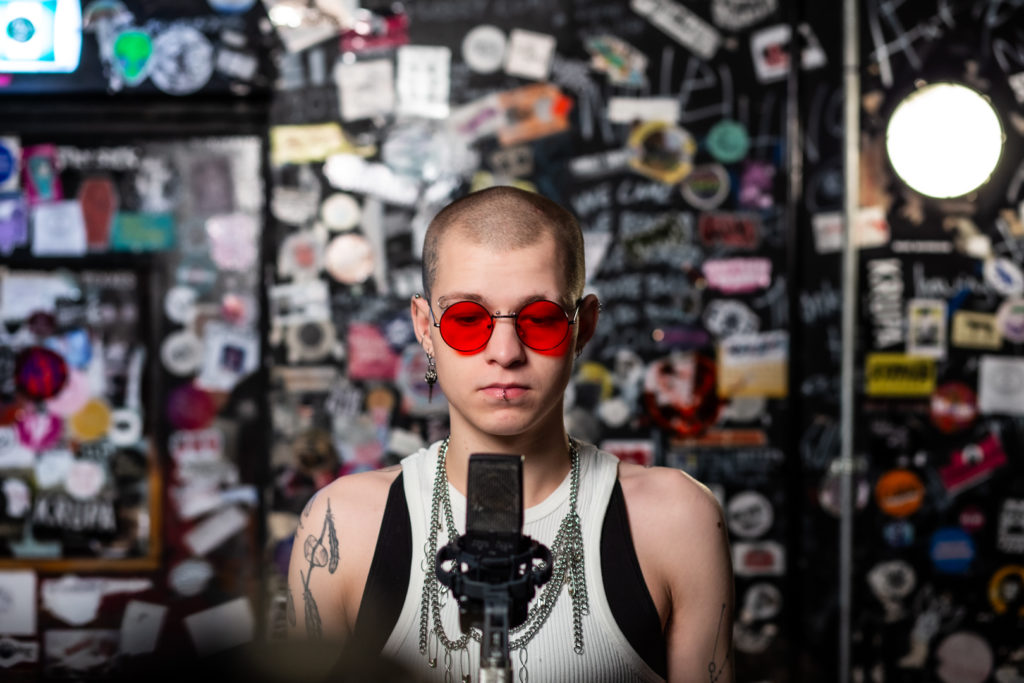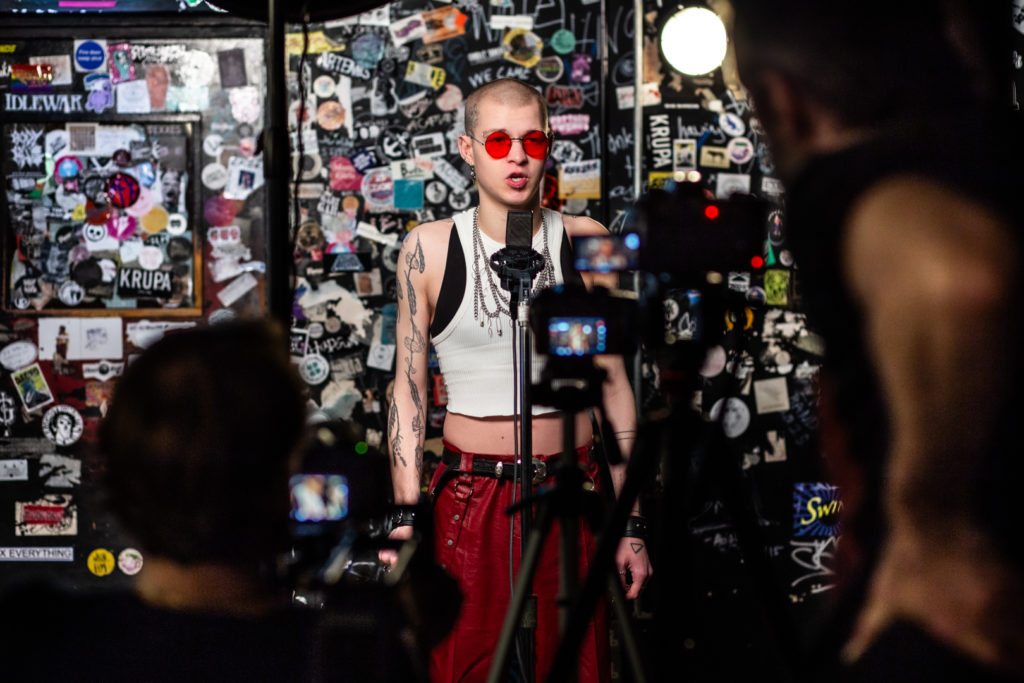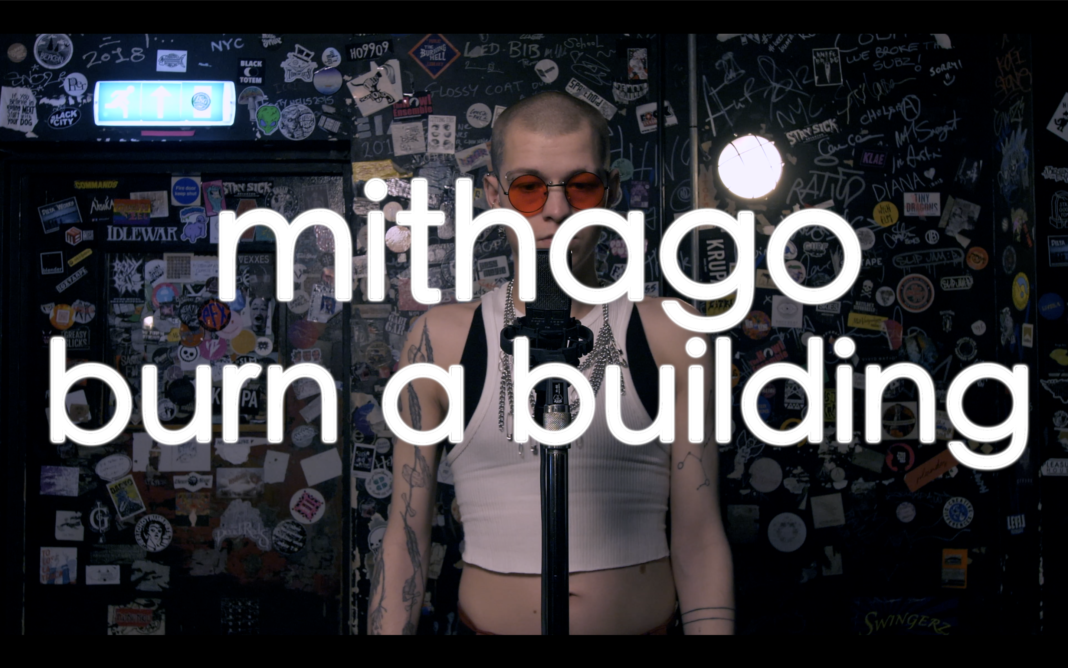After 8 years away from the video production scene social media accounts for Scroobius Pip suddenly started lighting up with an announcement. Mithago’s Burn A Building had moved him so much we just had to go take a look for ourselves. Crow Rudd writes;
Before I start, I cannot tell you how lucky I am to get to write this. I first heard ‘Burn A Building’ by Mithago at ‘PUNCHING UP!’, an anti-transphobia punk poetry event I co-hosted with Allographic, Rebel Riot and TransMuted via Zoom, and it absolutely tore the (digital) roof off the place.
It was the most talked-about performance from the whole gig. To hear it again, crisp and clear, excited me beyond measure – I had no idea THIS was the poem I’d signed up to review, and the sheer coincidence of it all makes me giddy.
To first tackle the obvious: this poem is a passionate call-to-arms that will get you up, on the barricades and slinging bricks with the rest of us. It is a gut punch, gripping the sides of your head and smushing your face right into the muck and grime of the subject matter. There is nowhere to hide as you’re pincushioned with Mithago’s expertly crafted and rapid wordsmithing.
It drags you in from the very first line: “If I die…” is the hook, Mithago the meat, and the lightning-quick following stanzas paint a picture of the political landscape of this country you cannot ignore, brushstrokes of red mirroring their glasses as Burn a Building unloads on the bleak reality of living as a trans person in this climate, barbed words cutting their defiance directly into your brain. “If I die here, don’t burn a candle, burn a building” feels like an anthem all on its own, a war cry, an absolutely beautiful phrase to build this poem around.

It’s hands-down my favourite part of this poem and I get chills every time I hear it. The chorus builds with “Don’t hold vigils, start riots, don’t write letters, start fires” and “When we die here, don’t let us die quiet” into a crescendo of exquisite, simple wordplay, the fluidity of these lines are truly delicious. I’ve listened to this all day and it just gets better and better.
The poem is a poignant, rebellious and inspiring tribute to Brianna Ghey, the 16 year old girl murdered in an act of transphobic violence. Mithago approaches the subject brutally, but still with a sensitivity that mirrors the outpouring of grief and support we all experienced in the wake of her death. It is both the hopeless; decrying the pitiful state of the government’s stance on the trans population, the constant attacks on our rights and the disgusting language used when discussing Brianna’s murder; and the hopeful; pulling the community together with a rallying cry that will echo across borders and through hearts.
“Always alert, or at least always nervous” and the preceding stanza is a dive into Mithago’s personal experience, opening itself up like an autopsy, exposing parts of their soul to the world to amplify the struggles of minorities living in a transphobic country. This perfectly bridges the topic of Brianna Ghey’s murder with the wider narrative, interweaving their experience and that of trans people as a whole and capped perfectly with this line, summing up the experiences of every single non-cis person I know.
This is the harsh reality, constant anxieties overriding any attempts at enjoyment when at risk of public attacks. Though, Mithago refuses to be swayed: “Do you think a little bit of brickwork’s gonna stop me… I made sure I could still run before I left the house in high heels” sways back into the defiant feel of the poem, uplifting the whole feel of the piece and injecting some well-needed hope into the narrative, a note hit again near the end: “Hurry home, and rest your weary eyes. Hurry home, I hope we will always make it out alive”.
This gels nicely with the premise established at the beginning with “Lost another sibling”, the heartbreaking implication being that losing a member of our community is akin to losing a beloved relative, and it’s true: our community is built on found family dynamics, so even if we don’t know the victim personally, it is still an equivalent loss.

The lines “Of course we’re pissed off and angry, we’re the ones burying casualties… We’re not the ones killing children” are delivered alongside a close-up of Mithago’s face to drive the point home that much harder. The whole video is simple, Mithago standing centre-frame and delivering the poem directly into the camera, the only changes to zoom in on their face as a method of underlining certain parts. The production is masterfully done, allowing the poem and performance to be the focus, Mithago’s words effortlessly carrying you along while its passionate performing style punctuates each line like it’s being thrown at you. It truly is performance poetry at its best: harrowing, immersive and completely unmissable.
I typically don’t like to describe things as ‘urgent’ or ‘vital’ as I feel those are placeholders for actual praise, they’re more nebulous concepts rather than concrete things that can be understood in a specific direction, but this whole poem feels IMPORTANT. It feels like a catalyst, a spark, a boulder beginning its descent down a mountain. This poem is careening towards population centres at breakneck speeds.
It is my genuine hope that anyone who doesn’t wholly believe that trans people are people worthy of respect, rights and the ability to live as we choose experience this poem and begin to reassess their position. This poem is a challenge, a flag planted and proudly displayed, I don’t see how anyone can hear this poem and not realise they’re on the wrong side of history.
Mithago has the power, I whole-heartedly believe, to turn the tide of this war on our human rights with their words, their actions, their immense talent and heart. ‘Burn a Building’ is a vicious, eloquent masterpiece and exactly the poem we need right now.











